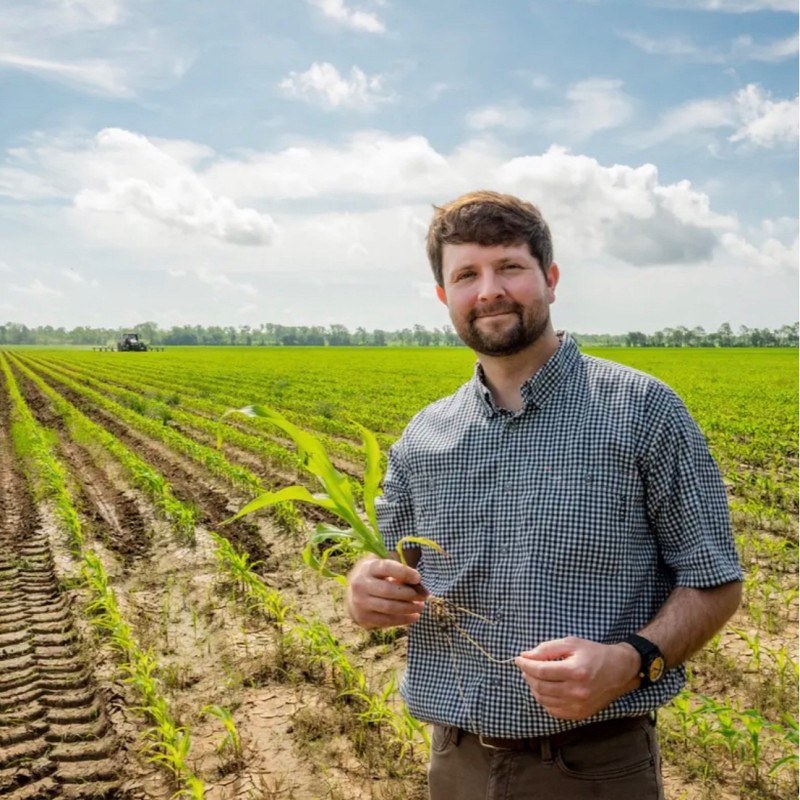Mencer: Keeping good records a necessity for farms with H-2A labor
Sept. 1, 2025
By Mary Hightower
U of Arkansas System Division of Agriculture
Fast facts:
- Farm operations need to understand intricacies of state, federal labor laws
- Full webinar replay is available online
(568 words)
(Newsrooms: Download photo of Mencer; SUBS headline, lede, 3rd graf to correct reference to H-2A)
UNDATED — For agriculture operations employing foreign labor under the H-2A visa program, keeping good records is paramount, said William Mencer, an ag law attorney and farmer from Lake Village.
Mencer, a fourth-generation farmer whose family grows rice, cotton, corn and soybeans, was the guest speaker for Wednesday’s National Agricultural Law Center webinar “Ag Labor Pointers & Pitfalls for Farming Operations.”
“We’ve participated in the H-2A program since the 1980s,” he said. “So, it's something that we've always had to pay attention to in our operation. We've always leaned on the H-2A program in order to keep the crops in the ground and get everything out every year.”
Demand for H-2A labor is high in the United States. The U.S. State Department issued 310,627 H-2A visas in 2023, up from 298,304 the previous year. The State Department forecasts annual H-2A visa applications to fall between 300,000 and 350,000 through the 2026 fiscal year.
Keeping records
“You've got to keep all of your records for at least three years,” Mencer said, noting that different laws and different agencies, such as Occupational Safety and Health Administration, “are going to have their own record-keeping thresholds and requirements.
“It’s a good practice to keep your application records if you're having to file for H-2A,” he said.
“For any operation, you need to keep good payroll records and pay stub records showing withholdings and things like that.”
In case allegations of violations result in an H-2A audit of the farm, “this is where good record keeping comes in,” Mencer said. “If you can point to your records proving that you did something right, then maybe you can go back to the officer and say, no, actually, we did it correctly, and he'll maybe take that charge off, or you can also try to get them to bring the fines down if you can prove that the violation wasn't as egregious as they're claiming that it was.”
Small farms, big farms
Mencer said there are many labor laws that small farms “may not be aware that a lot of these other labor laws apply and they may not even know they exist.”
When it comes to issues such as collective bargaining, Title VII of the Civil Rights Act, and the Americans with Disabilities Act, “a lot of smaller operations will be exempt,” he said.
However, “there are a slew of laws out there that apply to every agricultural realm,” Mencer said.
One example is workers’ compensation. In some states, such as Arkansas, agriculture is exempt from workers’ comp coverage requirements. However, that changes when H-2A is involved.
“Just by virtue of participating in H-2A, you know, you do have to have that coverage” for both the H-2A worker and any local hires, Mencer said.
“When you're making your labor certification to the Department of Labor, you have to ensure that you have adequate workers' comp coverage for all the employees that you're going to have on the farm,” Mencer said. “Whether that's local guys, green card guys, H-2A guys, you’ve got to add them all up.”
Wage rates are another area where the rules differ between state and federal. While the Fair Labor Standards Act exempts agriculture from the minimum wage, the act allows “states to write more stringent rules on wage rates. So, like California, if they want to have a higher wage than federal law prescribes, then they can do so,” Mencer said.
Find a replay of the whole conversation online.
To learn about extension programs in Arkansas, contact your local Cooperative Extension Service agent or visit www.uaex.uada.edu. Follow us on X and Instagram at @AR_Extension. To learn more about Division of Agriculture research, visit the Arkansas Agricultural Experiment Station website: https://aaes.uada.edu/. Follow on X at @ArkAgResearch. To learn more about the Division of Agriculture, visit https://uada.edu/. Follow us on X at @AgInArk.
About the National Agricultural Law Center
The National Agricultural Law Center serves as the nation’s leading source of agricultural
and food law research and information. The NALC works with producers, state and federal
policymakers, Congressional staffers, attorneys, land grant universities, and many
others to provide objective, nonpartisan agricultural and food law research and information
to the nation’s agricultural community.
The NALC is a unit of the University of Arkansas System Division of Agriculture and
works in close partnership with the USDA Agricultural Research Service, National Agricultural
Library.
About the Division of Agriculture
The University of Arkansas System Division of Agriculture’s mission is to strengthen agriculture, communities, and families by connecting trusted research to the adoption of best practices. Through the Agricultural Experiment Station and the Cooperative Extension Service, the Division of Agriculture conducts research and extension work within the nation’s historic land grant education system.
The Division of Agriculture is one of 20 entities within the University of Arkansas System. It has offices in all 75 counties in Arkansas and faculty on three campuses.
Pursuant to 7 CFR § 15.3, the University of Arkansas System Division of Agriculture offers all its Extension and Research programs and services (including employment) without regard to race, color, sex, national origin, religion, age, disability, marital or veteran status, genetic information, sexual preference, pregnancy or any other legally protected status, and is an equal opportunity institution.
# # #
Media contact: Mary Hightower
mhightower@uada.edu
